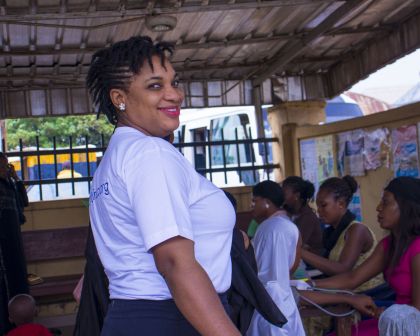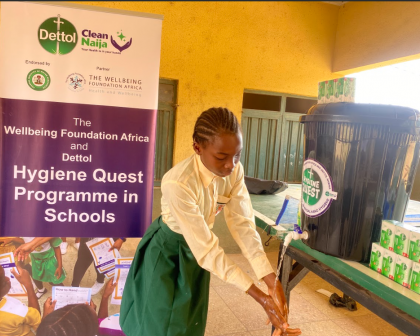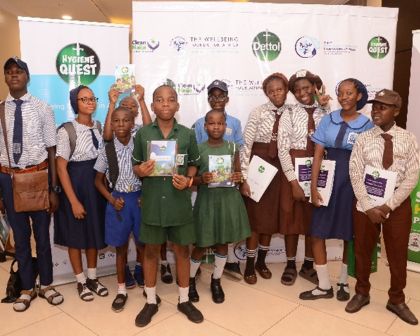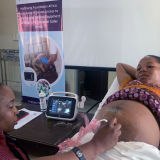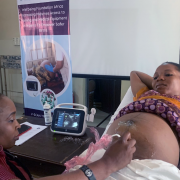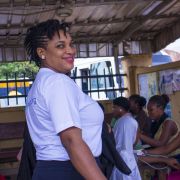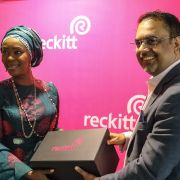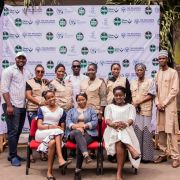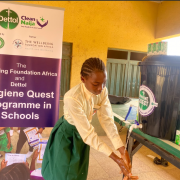Wellbeing Foundation Africa's H.E. Mrs Toyin Ojora Saraki Builds Bridges of Action Over Troubled Water, Sanitation and Hygiene Conditions - At United Nations High-Level Political Forum on Sustainable Development, New York City
Global Call To Action Statement on WASH: Her Excellency Mrs Toyin Ojora Saraki, Founder-President, Wellbeing Foundation Africa (WBFA)
2018 United Nations High Level Political Forum on Sustainable Development
Women Deliver
“Partnerships that Deliver for Girls and Women – an interactive dialogue to break down silos and achieve the SDGs”
Wednesday 11th July 2018
The Scandinavia House, 58 Park Avenue, New York, NY 10016
Thank you for the kind invitation to attend this dialogue on how we can break down silos to achieve the SDGs and deliver for girls and women.
As the Founder-President of the Wellbeing Foundation Africa (WBFA), I am committed to delivering for women, girls and communities – through safe births, education and wellbeing, so I am pleased that there is a strong representation at this dialogue to discuss water, sanitation and hygiene (WASH) – not only because the High Level Political Forum is reviewing progress towards Goal 6: Ensure availability and sustainable management of water and sanitation for all, but because WASH is, in my view, the strongest example of a goal which is affected by silos – from a global health perspective, as well as on national and regional levels.
Too often WASH falls between purviews – in particular between departments for the environment and health. To achieve Goal 6 and deliver for girls in doing so will require strong political leadership and innovative partnerships at every level, thus the WBFA has risen to the WASH imperative, in rallying forces with Global Water 2020, the WHO and other global partners to launch a new global, regional and national WASH campaigns.
The Water Institute at the University of North Carolina, in its analysis of 129,000 health care facilities in the developing world, found more than 65 percent of facilities lack both running water and soap for handwashing. Data from a subset of six countries — Bangladesh, Haiti, Malawi, Nepal, Senegal, and Tanzania — revealed that only 2 percent of their health care facilities have concurrent access to water, sanitation, hygiene, and waste management services.
Recent World Bank Water data reveals that in my country, Nigeria, WASH indices have actually suffered an alarming decline from an already critical condition. Access to piped water on premises in urban areas dropped from 30% in 1990, to less than 10% in 2015. The World Bank has also revealed that for Nigeria to achieve the WASH SDGs, it must invest at least three times more than it does today. Unfortunately, inadequate priority has been given to this demographic imperative in the nation's approved World Bank loan application, despite the fact that WASH standards will be a fundamental element of any successful economic recovery plan. At the Foundation's program locations across Nigeria, our MamaCare midwives are lifesavers – but they can only do so much for women and their infants if WASH conditions are dangerous.
This on-the-ground reality results in the inability to implement the most basic infection control measures, a situation that not only endangers patients and staff, but also presents a danger to all of us. Health facilities are the epicenters for pandemic containment, but the lack of WASH contributes to further spread of disease.
When it comes to patients, among the most vulnerable are pregnant women and newborns, both at great risk of sepsis — a leading cause of death in hospitals. WaterAid found that half the primary health facilities it surveyed in Nigeria did not even have handwashing facilities in delivery rooms. The scope of this problem extends far beyond Nigeria, of course, to a majority of health care facilities in developing countries throughout Africa, Asia, Latin America, and the Middle East.
We know that access to WASH in health care facilities is a major global problem, one that is readily solvable, but largely ignored by the international community — until recently. In March 2018, United Nations Secretary-General António Guterres recognized the need to address this urgent health concern with the launch of the Water Action Decade and his call to action in which he specifically challenged the global community to achieve universal WASH access in all health care facilities by 2030.
We in the global health and development communities cannot allow mothers and newborns to die from preventable and unnecessary complications, simply because the most basic of WASH services are not available.
The Wellbeing Foundation Africa has committed to work with its partners to around the world to ensure that all countries implement the 2017 World Health Assembly Sepsis Resolution. Hand hygiene must be a quality indicator in every facility and a national marker of health care quality, with access to soap and water monitored and assessed.
As with access to healthcare, access to education for a girl is not enough. To truly transform the educational chances for girls, we must go beyond the notion of ‘access’ and consider not only ‘quality’ but also ‘safety’ and ‘sustainability.’ UNESCO estimates that 130 million girls between the age of 6 and 17 are out of school and 15 million girls of primary-school age—half of them in sub-Saharan Africa— may never enter a classroom.
Poor WASH conditions are a key factor inhibiting girls attending school. One in ten girls in Sub-Saharan Africa do not attend school during their menstrual cycle, and can miss as much as twenty percent of a given school year. That is a question of both resource allocation and the input of those who know what girls need to be able to feel safe at school.
I look forward to the outcomes of this dialogue and I hope to work with all stakeholders in overcoming silos that hamper integration of the WASH demographic imperative into state actions. Thank you again for holding this crucial high-level dialogue. I know that together we can build bridges of action over troubled water, sanitation and hygiene conditions in health facilities, schools, homes and communities, to achieve the SDGs, and deliver for good, for women and girls.
Share this Article

Toyin Ojora Saraki
Toyin Saraki is Founder-President of the Wellbeing Foundation Africa (WBF Africa), a pan-African maternal health and wellbeing charity. WBF Africa has become one of the most influential and active organisations in the area of maternal, newborn and child health (MNCH), working across sectors to deliver innovative solutions such as its flagship WBFA IMNCH Personal Health Record© and the MamaKit. WBF Africa goes beyond aid; it is dedicated to advocacy and the formation of best practices in health, education, women’s empowerment and social welfare. A qualified barrister, Toyin Saraki built a successful private sector career before dedicating the last 21 years to philanthropy.
Read More

